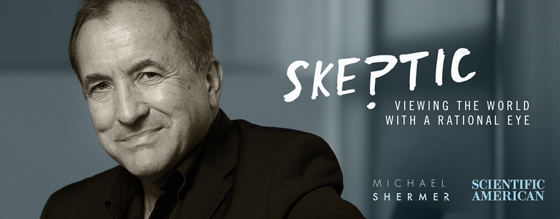A book chapter written by Michael Shermer for The Palgrave Handbook of Philosophy and Public Policy (December 26, 2018), edited by David Boonin.

Free to Inquire
The Evolution-Creationism Controversy as a Test Case in Equal Time & Free Speech
During the second week of March, 1837, barely a year and a half after circumnavigating the globe in the H.M.S. Beagle, Charles Darwin met with the eminent ornithologist John Gould, who had been studying Darwin’s Galápagos bird specimens. With access to museum ornithological collections from areas of South America that Darwin had not visited, Gould corrected a number of taxonomic errors Darwin had made, such as labeling two finch species a “Wren” and “Icterus”, and pointed out to him that although the land birds in the Galápagos were endemic to the islands, they were notably South American in character.
According to the historian of science Frank J. Sulloway, who carefully reconstructed Darwin’s intellectual voyage to the discovery of the theory of evolution by means of natural selection, Darwin left the meeting with Gould convinced “beyond a doubt that transmutation must be responsible for the presence of similar but distinct species on the different islands of the Galápagos group. The supposedly immutable ‘species barrier’ had finally been broken, at least in Darwin’s own mind.”1 That July Darwin opened his first notebook on Transmutation of Species. By 1844 he was confident enough to write in a letter to his botanist friend and colleague Joseph Hooker: “I was so struck with distribution of Galapagos organisms &c &c, & with the character of the American fossil mammifers &c &c, that I determined to collect blindly every sort of fact which cd bear any way on what are species.” Five years at sea and nine years at home pouring through “heaps” of books led Darwin to admit: “At last gleams of light have come, & I am almost convinced, (quite contrary to opinion I started with) that species are not (it is like confessing a murder) immutable.”2
Like confessing a murder. How could a solution to a technical problem in biology, namely the immutability of species, generate such angst in its discoverer? The answer is obvious: if new species are created naturally instead of supernaturally, there’s no place for a creator God. No wonder Darwin waited twenty years before publishing his theory, and he would have waited even longer had he not rushed into print for priority sake because the naturalist Alfred Russel Wallace had sent Darwin his own theory of evolution in 1858, the year before Darwin published On the Origin of Species.3 And no wonder it took some time for Darwin to convince others of the theory’s veracity. The geologist Charles Lyell, a close friend and colleague of Darwin who groomed him into the world of British science and whose geological works Darwin read on the Beagle, withheld his support for a full nine years, and even then pulled back from fully embracing naturalism, leaving room for providential design underlying the entire natural system. The astronomer John Herschel sniffed at natural selection, calling it the “law of higgledy-piggledy.” In a review in the popular Macmillan’s Magazine, the statesman and economist Henry Fawcett spoke of a great divide created by Darwin’s book: “No scientific work that has been published within this century has excited so much general curiosity as the treatise of Mr. Darwin. It has for a time divided the scientific world with two great contending sections. A Darwinite and an anti-Darwinite are now the badges of opposed scientific parties.”4
Darwinites and anti-Darwinites. After a century and a half there is now overwhelming consensus within the scientific community that evolution happened and that natural selection is the driving force behind it. Among scientists, there are only Darwinites. Publicly, however, the picture is disturbingly divided, especially along political and religious lines, where the anti-Darwinites have captured a sizable portion of the populace. A 2005 Pew Research Center poll, for example, found 42 percent of Americans holding strict creationist views that “living things have existed in their present form since the beginning of time.” The survey also found that 64 percent said they were open to the idea of teaching creationism in addition to evolution in public schools, while 38 percent said they think evolution should be completely replaced by creationism in biology classrooms. Most alarmingly, a sizable 41 percent believe that parents, rather than scientists (28 percent) or school boards (21 percent) should be responsible for teaching children about the origin and evolution of life.5 More recent polling data found similar percentages of belief in creationism and skepticism about evolution. In a 2014 Gallup poll 42 percent of Americans said that “God created humans in present form” while 31 percent said “Humans evolved, with God guiding.” There was a slight uptick to 19 percent of Americans who agreed that “Humans evolved, but God had no part in the process,” but that was at least a significant gain from the paltry 9 percent in 1982. […]
Follow Michael Shermer on
Twitter • Facebook • Blog • YouTube











